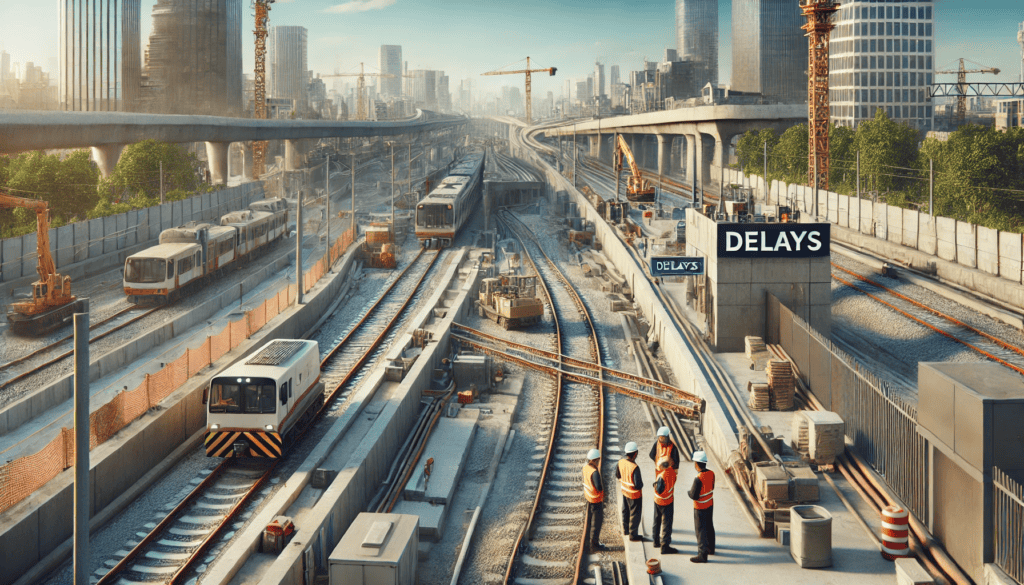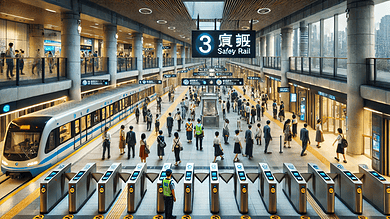Light Rail Project Dispute Resolution: Expert Witness Perspectives

Light Rail Project Dispute Resolution
Rail projects are among the most complex infrastructure endeavors undertaken by modern societies. They involve numerous stakeholders, intricate engineering challenges, significant financial investments, and stringent regulatory requirements.
With these complexities come various potential disputes that can hinder progress, escalate costs, and delay completion. Effective light rail dispute resolution is essential for maintaining project timelines and budgets and ensuring successful completion.
Disputes in rail projects can arise from various sources, including contract disagreements, construction delays, cost overruns, and safety issues. Addressing these disputes promptly and effectively is critical to the project’s success.
Expert witnesses are crucial in resolving these disputes by providing objective, technical, and professional insights.
This article delves into the common types of disputes in rail projects, the role of expert witnesses in dispute resolution, strategies for effective dispute resolution, and the importance of these strategies in maintaining project integrity.
Common Types of Disputes in Rail Projects
Contract Disagreements
Contracts form the backbone of rail projects, outlining all parties’ responsibilities, deliverables, and expectations. However, contract disagreements are common, arising from unclear terms, differing interpretations, or perceived breaches.
Disputes over scope changes, contract variations, and payment terms can significantly delay project progress and lead to costly legal battles.
Construction Delays
Construction delays are another frequent source of disputes. Delays can result from unforeseen site conditions, adverse weather, supply chain disruptions, or labor shortages.
Delays often lead to disputes over who is responsible and who should bear the associated costs. These delays not only escalate costs but also extend project timelines, impacting the overall schedule and efficiency of the rail project.
Cost Overruns
Cost overruns occur when the project’s actual costs exceed the initial budget estimates. Various factors, including inaccurate cost estimates, changes in project scope, price inflation for materials, and inefficient project management, can cause these overruns.
Disputes over cost overruns are particularly contentious, as they directly affect the project’s financial viability and the stakeholders’ interests.
Safety Issues
Safety is paramount in rail projects, and any lapses can lead to severe consequences, including accidents, injuries, and fatalities. Disputes related to safety issues often involve accusations of negligence, non-compliance with safety standards, and inadequate safety measures.
These disputes require thorough investigation and expert analysis to determine the root cause and assign responsibility.
Impact on Project Timelines and Budgets
Disputes in rail projects can profoundly impact project timelines and budgets. They can halt progress, drain financial resources, and damage stakeholder relationships.
Effective dispute resolution in rail projects is essential to mitigate these impacts and ensure that projects stay on track and within budget.

Role of Expert Witnesses in Light Rail Project Dispute Resolution
Providing Objective Analysis
Expert witnesses bring a wealth of knowledge and experience to the dispute resolution process. Their primary role is to provide objective analysis and opinions based on their expertise. In the context of rail projects, this includes assessing technical aspects, evaluating compliance with industry standards, and interpreting complex data.
Insights from Rail Project Management Experts
A rail project management expert offers valuable insights into project execution and management. These experts can identify the root causes of management-related disputes, such as inadequate planning, poor communication, and inefficient resource allocation.
Their expertise helps them understand how project management practices impact project outcomes and recommend improvements to avoid future disputes.
Technical Evaluations by Rail Infrastructure Expert Witnesses
A rail infrastructure expert witness provides technical evaluations and assessments of the physical components of the rail project. This includes evaluating the quality of construction, the integrity of materials used, and the adherence to engineering specifications.
Their technical assessments are crucial in resolving disputes related to construction quality, safety standards, and compliance with regulatory requirements.
Examples of Expert Witness Impact
Several hypothetical cases illustrate the pivotal role of expert witnesses in resolving rail project disputes. In one notable case, a rail infrastructure expert witness identified critical flaws in the construction of a rail bridge, leading to a resolution that involved remedial works and compensation for delays.
In another case, a rail project management expert provided testimony that highlighted poor project planning and resource allocation, resulting in a favorable settlement for the aggrieved party.

Strategies for Effective Light Rail Project Dispute Resolution
Early Dispute Resolution Mechanisms
Early dispute resolution mechanisms can prevent minor issues from escalating into major disputes. This includes establishing clear communication channels, regular project reviews, and early intervention by mediators or arbitrators.
Proactive communication helps identify and address potential disputes early before they significantly impact the project.
Mediation, Arbitration, and Litigation
Several techniques exist for resolving disputes in rail projects, including mediation, arbitration, and litigation. Mediation involves a neutral third party facilitating negotiation between the disputing parties to reach a mutually acceptable solution.
Arbitration is a more formal process in which an arbitrator makes a binding decision based on the evidence presented. Litigation, the most formal and adversarial approach, involves resolving disputes in court.
Each technique has its advantages and disadvantages. Mediation is less formal, often faster, and less costly than arbitration or litigation, but it requires cooperation between the parties.
Arbitration is more structured than mediation and provides a binding resolution, but it can be more expensive.
Litigation, while providing a definitive legal resolution, is typically the most time-consuming and costly option.
Importance of Documentation and Clear Contracts
Proper documentation and clear contracts are fundamental in preventing and resolving disputes. Contracts should clearly outline all parties’ responsibilities, deliverables, and expectations. Detailed documentation of project progress, changes, and communications helps provide evidence during dispute resolution.
Regular project audits and third-party evaluations can also ensure the project is on track and compliant with all contractual and regulatory requirements.
Insights from Expert Witnesses
Expert witnesses provide valuable insights into effective dispute-resolution practices. Their expertise in project management and technical evaluations helps them understand the nuances of rail projects and the best practices for preventing and resolving disputes.
They can recommend improvements in contract management, project planning, and safety protocols to minimize the likelihood of disputes.
Role of Communication in Project Dispute Resolution
Effective communication is crucial in preventing and resolving disputes. Open and transparent communication channels between all stakeholders help identify potential issues early and address them before they escalate.
Regular meetings, progress reports, and updates ensure that all parties know the project’s status and any emerging concerns. Clear and consistent communication helps build trust and collaboration among stakeholders, reducing the likelihood of disputes.
Utilizing Technology for Dispute Resolution
Advancements in technology have significantly improved the dispute-resolution process in rail projects. Project management software, real-time monitoring systems, and data analytics help track project progress, identify potential issues and make informed decisions.
Technology facilitates effective documentation and record-keeping, providing valuable evidence during dispute resolution. By leveraging technology, project managers can enhance efficiency, transparency, and accountability, reducing the risk of disputes.
Training and Capacity Building
Investing in training and capacity building for project managers and stakeholders is essential for effective dispute resolution. Training programs on contract management, negotiation skills, conflict resolution, and regulatory compliance equip project managers with the necessary knowledge and skills to handle disputes effectively.
Capacity-building initiatives also foster a culture of proactive problem-solving and collaboration, reducing the likelihood of disputes and promoting project success.

Effective Resolution Strategies
Disputes are inevitable in complex rail projects, but they do not have to derail progress. Understanding the common types of disputes, the role of expert witnesses, and effective resolution strategies is crucial for maintaining project timelines and budgets.
Expert witnesses, including rail project management experts and rail infrastructure expert witnesses, provide objective analysis and technical evaluations that are invaluable in resolving disputes.
Implementing robust dispute resolution in rail projects can significantly reduce conflicts, ensuring that projects are completed successfully and efficiently.
Effective light rail dispute resolution is essential for maintaining project timelines and budgets and ensuring successful completion.
By employing strategic dispute resolution methods and leveraging the expertise of expert witnesses, rail project stakeholders can navigate the complexities of disputes and achieve positive outcomes.

